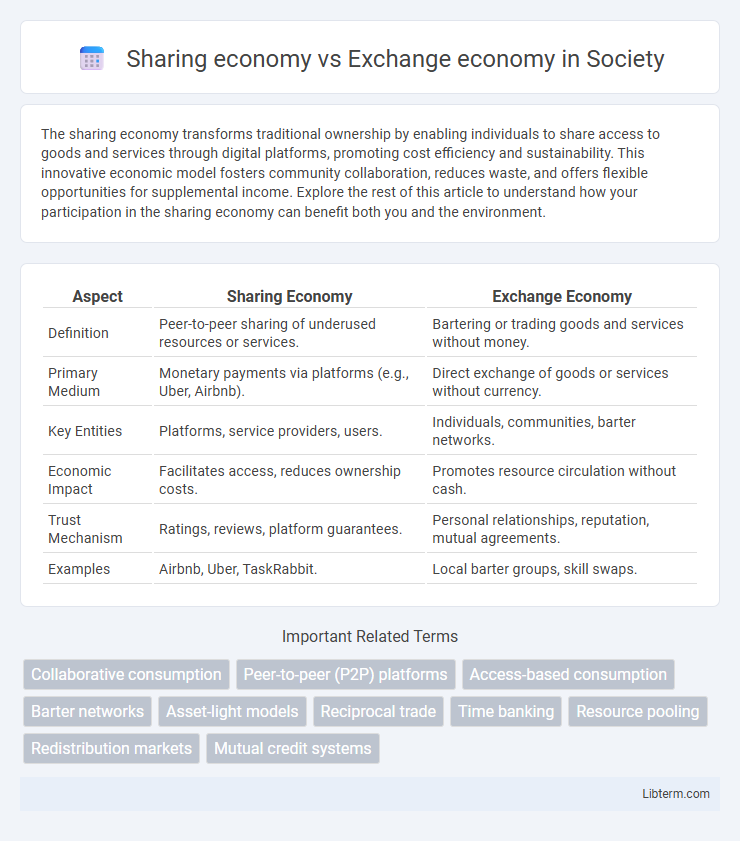The sharing economy transforms traditional ownership by enabling individuals to share access to goods and services through digital platforms, promoting cost efficiency and sustainability. This innovative economic model fosters community collaboration, reduces waste, and offers flexible opportunities for supplemental income. Explore the rest of this article to understand how your participation in the sharing economy can benefit both you and the environment.
Table of Comparison
| Aspect | Sharing Economy | Exchange Economy |
|---|---|---|
| Definition | Peer-to-peer sharing of underused resources or services. | Bartering or trading goods and services without money. |
| Primary Medium | Monetary payments via platforms (e.g., Uber, Airbnb). | Direct exchange of goods or services without currency. |
| Key Entities | Platforms, service providers, users. | Individuals, communities, barter networks. |
| Economic Impact | Facilitates access, reduces ownership costs. | Promotes resource circulation without cash. |
| Trust Mechanism | Ratings, reviews, platform guarantees. | Personal relationships, reputation, mutual agreements. |
| Examples | Airbnb, Uber, TaskRabbit. | Local barter groups, skill swaps. |
Introduction to Sharing Economy and Exchange Economy
The sharing economy revolves around peer-to-peer access to goods and services, leveraging digital platforms to facilitate temporary use rather than ownership. In contrast, the exchange economy centers on trading goods and services, often involving direct or mediated reciprocity without the focus on shared access. Digital innovations and collaborative consumption drive the sharing economy, while traditional barter and market transactions epitomize the exchange economy.
Key Principles of the Sharing Economy
The sharing economy operates on the principle of access over ownership, enabling individuals to temporarily share underutilized assets, such as cars, homes, or skills, through digital platforms. It relies on trust, peer-to-peer collaboration, and decentralized networks to maximize resource efficiency and reduce waste. Unlike the exchange economy, which emphasizes direct transactions and ownership transfer, the sharing economy fosters community engagement and sustainability by prioritizing accessibility and mutual benefit.
Fundamental Concepts of the Exchange Economy
The exchange economy centers on the direct trading of goods and services between parties without intermediaries, driven by principles of supply, demand, and mutual benefit. It relies on the fundamental concept of reciprocal transactions where value is exchanged based on the preferences and needs of the participants. In contrast, the sharing economy emphasizes access and collaborative consumption, often leveraging digital platforms to facilitate shared use rather than ownership transfer.
Comparison: Ownership vs Access
Sharing economy emphasizes access over ownership, enabling individuals to use goods or services temporarily without purchasing them outright. Exchange economy traditionally centers on transferring ownership through direct trade or sale, where goods or services are permanently exchanged between parties. This fundamental difference shifts consumer behavior, with sharing economy fostering collaborative consumption and reducing resource waste, while exchange economy relies on individual ownership rights and property transfer.
Platforms Driving Sharing and Exchange Economies
Platforms driving the sharing economy, such as Airbnb and Uber, utilize digital technology to facilitate peer-to-peer access to goods and services, emphasizing temporary use rather than ownership. In contrast, platforms supporting exchange economies, including eBay and Craigslist, enable the transfer of ownership through buying, selling, or bartering items within a decentralized marketplace. Both types of platforms rely heavily on trust mechanisms, user reviews, and efficient matching algorithms to optimize resource allocation and user engagement.
User Motivations in Each Model
User motivations in the sharing economy center on access, cost savings, and community building, with individuals seeking convenience and sustainability by sharing assets like cars or homes. In contrast, the exchange economy drives users primarily by mutual benefit and value reciprocity, emphasizing barter or trade systems where goods and services are swapped directly. The sharing economy often appeals to users motivated by social trust and environmental consciousness, while the exchange economy attracts those focused on acquiring specific items or services without monetary transactions.
Economic and Social Impacts
The sharing economy promotes resource efficiency by enabling access over ownership, reducing costs and environmental impact, while the exchange economy relies on direct trade of goods and services, often emphasizing reciprocal value. Economically, the sharing economy can stimulate innovation, lower barriers to entry for service providers, and create flexible labor markets, whereas the exchange economy supports more traditional economic roles and localized transactions. Socially, the sharing economy fosters community engagement and trust through digital platforms, but may also exacerbate inequalities and regulatory challenges, contrasting with the exchange economy's established social norms and often stronger localized social cohesion.
Challenges and Risks Involved
Sharing economy faces challenges such as regulatory uncertainty, trust issues among users, and potential exploitation of labor, posing risks to legal compliance and fair compensation. Exchange economy encounters difficulties in ensuring equitable value distribution and preventing market monopolies, which can result in economic inefficiencies and reduced consumer welfare. Both systems must address cybersecurity threats and data privacy concerns to maintain user confidence and safeguard transactions.
Future Trends in Collaborative Consumption
Future trends in collaborative consumption emphasize the evolution from traditional exchange economies, which rely on direct barter systems, toward more scalable and technology-driven sharing economies that optimize asset utilization through digital platforms. Innovations in blockchain and AI are enhancing trust and transparency, enabling peer-to-peer transactions and dynamic pricing models that boost efficiency. As sustainability concerns rise, collaborative consumption is expected to integrate circular economy principles, promoting resource reuse and reducing waste on a global scale.
Conclusion: Which Model Suits Modern Society?
The sharing economy, driven by digital platforms and peer-to-peer transactions, enhances resource efficiency and accessibility in modern urban environments. Exchange economies, rooted in traditional barter and market systems, emphasize direct value swaps but may lack scalability in globalized contexts. For contemporary society, the sharing economy better aligns with technological integration, sustainability goals, and consumer convenience.
Sharing economy Infographic

 libterm.com
libterm.com